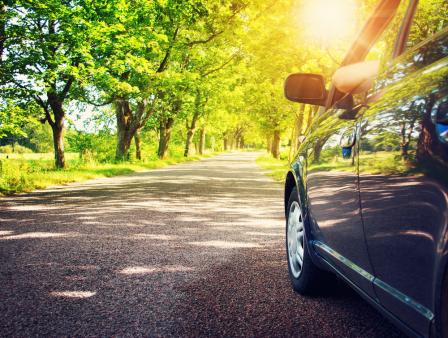Are you guilty of these?
Summertime Do’s and Don’ts for Your Car

Winter is generally regarded as the harshest, most demanding season your car is subjected to. Here’s the thing though: summer is no picnic either, at least not for your car. Below Toby Shultz, Senior Automotive Editor at Your Mechanic, has compiled a list of things you should and shouldn’t do concerning your car, to help ensure both you and your trusty ride have a fun and adventure filled summer.
Do’s
Do perform regular coolant flushes: Cars today are sold as having “lifetime” coolant. And they do last a lifetime… of the coolant. The problem is that coolant breaks down over time, losing its lubrication properties, increasing the freeze point, and becoming more acidic. No coolant should ever be expected to last the lifetime of the vehicle, unless the life of the vehicle is expected to be pretty short. Some of the major auto manufactures backpedaled slightly on the whole lifetime fluids thing, specifying later that lifetime fluids should be changed at 100,000 miles. Changing your coolant every 4 years or 50,000 miles is a much safer bet to ensure your engine doesn’t suffer cooling system problems in the future. You can have a coolant flush performed by a qualified technician, such as one from Your Mechanic.
Do watch closely for overheating: Temperature gauges in cars are starting to become like full size spare tires; completely absent from many newer vehicles. If your car has a temperature gauge, be sure to check it occasionally while driving, especially when driving in very hot conditions. If it doesn’t have a gauge and instead relies on a light, be sure to pull over immediately if and when you see that red light start to flash.
Do use a windshield sunshade: These things are seriously awesome. They get placed inside the car against the windshield, and have a reflective surface that faces outward to deflect the sun rays and the associated rise in temperature. They also help protect your dash from harmful UV rays and heat damage.
Do leave your windows cracked slightly to reduce temperature: On the topic of reducing in car temperatures while parked, leaving your windows open slightly is a great way to reduce the temperature by at least a few degrees. It can still get incredibly hot inside, but every little bit helps. It also helps to vent odors that may build up from things left in the car.
Do keep your car waxed to protect the finish: At the beginning of the summer, it’s a good idea to give your car a wash and a good coat of wax to protect the paint from the summer heat. Even if you live in drought stricken areas, there are ways to wash your car with very little impact. Many car wash and detail businesses also offer a low water wash option.
Do keep tire pressure at an ideal range: Tire pressures should be properly maintained throughout the entire year, but during the summer months, the ideal pressure may change slightly. The higher temperature of the pavement and of the air will lead to higher tire temperatures, which increases pressure. You’ll just have to check it often, and see what works best for you.
Do check your oil level frequently: Checking your oil level should be done year round, but it’s especially important in summer months when everything is hotter. Old school thought was to run a different weight oil for the summer than the winter; that idea is long gone though. Modern high quality, multi viscosity oils have eliminated the need for that. Although your engine is cooled using the cooling system, the oil also helps regulate the engine temperature somewhat, and if the level gets low the oil temperature can climb too high very quickly, causing it to degrade and thin out, losing its lubrication properties.
Do use an interior conditioner to protect your dash: Off the shelf interior protectants work great to provide an extra layer of protection for your dash, and help to keep it from drying out and cracking. If you prefer something more natural, you can use a light coat of mineral oil to do the job; just be sure not to apply any protectant to the steering wheel or shifter, as they can become very slippery after application.
Don’ts
Don’t leave pets in cars, even with the windows open: Even with the windows cracked open, on a 90°F day, the interior temperature of a car can reach 140°F. Dogs are unable to sweat, they are covered in fur, and they are unable to open the car doors to get out and cool off. Many pets die each year from being left in the car on a hot day, so please, leave them at home where they will be safe from the heat.
Don’t use air conditioning in extremely hot temperatures: I know this seems counterintuitive, but if you are driving in extremely hot conditions, such as across the desert in southern California or Arizona, don’t use your air conditioning. The air conditioner puts extra load on the engine, and can lead to overheating the car, potentially leaving you stranded.
Don’t drive on your winter tires: Winter tires are great… at driving in the winter. They do so well because they are made of a much softer tread compound that stays soft in cold weather, allowing the tire to get better traction. They also have smaller tread blocks with more siping, to disperse snow and water without hydroplaning. These same qualities make them very vulnerable to accelerated wear and poor handling in summer conditions. It’s best if you can swing having two sets of wheels and tires, one with winter tires and one with summer or all season tires.
Don’t run your car low on fuel: Most modern vehicles have the fuel pump located inside the fuel tank. It relies on being surround by fuel to keep the pump motor cool. When fuel is run very low, the pump has no fuel surrounding it, so it is susceptible to overheating the pump and premature failure. When the outside temperature is high, this effect is accelerated, and can lead to even earlier failure of the pump.
Don’t leave food in your car: With how hot the inside of a parked car can get, it should be common sense not to leave any food items in the car. Best case scenario, it spoils or melts your food. Worst case scenario, it causes sugary drinks to explode or melted foods to make a mess of your car’s interior, or you may have the smell of spoiled food stuck in your interior for a long time. If you do wind up with some funky smells in your car, follow this guide to try getting them out.
Don’t leave plastic water bottles in your car: Single use plastic water bottles are the bane of our existence. Of the 50,000,000,000 (yes that’s 50 billion) purchased each year, over 80% of them end up in landfills, even though they are recyclable. What’s worse, is if you leave them in your hot car, the chemicals that the plastic bottles are made of can leech into the water you would be drinking, and can cause serious health concerns over time. Better to just buy a nice reusable bottle, and carry it with you all the time.
—
Toby Schultz is the senior automotive editor at YourMechanic.com. Your Mechanic delivers mobile car repair by certified mechanics in over 700 U.S. cities. Their top-rated technicians can perform over 600 services at your home or office and will even answer your questions online.
